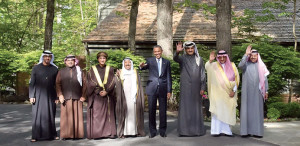Gulf Times
Reuters/Camp David, Maryland
US President Barack Obama with HH the Emir of Qatar Sheikh Tamim bin Hamad al-Thani and other GCC leaders UAE Crown Prince Sheikh Mohamed bin Zayed al-Nahyan, Bahrain Crown Prince Salman bin Hamad al-Khalifah, Oman Deputy Prime Minister Sayyid Fahd bin Mahmoud al-Said, the Emir of Kuwait Sheikh Sabah al-Ahmed al-Jaber al-Sabah, Saudi Crown Prince Mohamed bin Nayef and GCC Secretary General Abdul Latif bin Rashid al-Zayani. at Camp David in Maryland yesterday.
President Barack Obama vowed yesterday to back Gulf allies against any “external attack,” seeking to reassure them of Washington commitment to their security amid Arab anxiety over US-led efforts to reach a nuclear deal with Iran.
Obama, hosting the six-nation Gulf Co-operation Council for a rare summit at the Camp David presidential retreat, pledged that the US would co-operate with them to address what he called Iran’s “destabilising activities in the region.”
“The US will stand by our GCC partners against external attack and will deepen and extend co-operation that we have,” Obama told reporters, with Gulf leaders standing by his side at the end of the talks.
Obama promised a “concrete series of steps” from the one-day summit as he sought to allay Gulf Arab fears that the potential lifting of international sanctions on Tehran would embolden it in the region and raise the risk of more sectarian strife. But US officials said the increased US commitments would stop short of a formal defence treaty that some of the Gulf countries had sought.
Differences over US policy toward Tehran, Syria’s civil war and the Arab Spring uprisings loomed over the meetings.
Obama focused the early part of the meeting on updating Gulf Arab leaders on efforts to reach an atomic deal with Iran, assuring them he was seeking a “transaction” on the nuclear issue and not a “broader rapprochement” with Tehran, according to Ben Rhodes, the president’s deputy national security adviser.
White House officials said there would be no formal defence pact, as some Gulf leaders had sought, and that the summit would instead produce announcements on integrating ballistic missile defence systems, easing weapons deliveries and increasing joint military exercises.
Other members of the GCC are Qatar, Kuwait, Bahrain, the United Arab Emirates and Oman.
After flying in by helicopter, Obama and the Gulf leaders got down to work in Camp David’s rustic cabin-like conference centre.
Gulf Arab leaders are concerned that lifting Western sanctions as part of a nuclear deal between six major powers and Iran would give Tehran a cash windfall to increase funding to Shia militias around the region, sowing further sectarian strife in volatile countries such as Syria, Yemen and Iraq.
Rhodes insisted the Obama administration was mindful of the broader Iranian threat and was ready to give Gulf allies “clear assurances” of US security commitments, including help to forge a regionwide anti-missile system and to beef up their maritime security in the world’s most important oil routes.
The US and the five other world powers are working toward a June 30 deadline for a final deal with Tehran to curb its atomic program in return for sanctions relief.
The Obama administration would like GCC support for its diplomatic efforts with Iran, or at least a toning-down of any criticism, to help convince a sceptical US Congress it has broad backing in the region. There was no immediate sign that Gulf leaders had backed away from their earlier misgivings about the emerging Iran deal.








